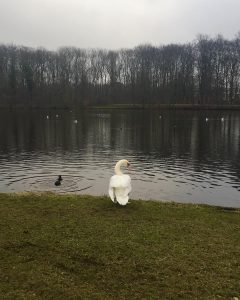My Story With Self-Esteem
“ No way” said the lady incredulously, “She can’t be your daughter!”
“Yes, she is,” insisted my stepmother, looking a bit uncomfortable.
“Then why is she abdeh and you are not?” retorted the lady smugly.
Abdeh is an Arabic word that literally means a slave. It is the word that ignorantly was and perhaps still is sometimes used to mean black.
These were the kinds of encounters that I repeatedly experienced during my childhood and teenage years in Lebanon in the 1970s. Sometimes instead of my stepmother, it would be one of my half sisters being challenged. It was understandable as I was black and the rest of my family members were white. Without my Ghanaian mother’s presence in my life, strangers outside our family could not figure out the connection.
It is then not really surprising that I grew up feeling like I didn’t belong. I stood out even amongst my own flesh and blood, the only kid with black skin and frizzy hair. My parents divorced when I was a baby and my paternal grandmother, whom I called Teita, brought me up in The Lebanon.
Even when I later moved to live briefly in Ghana for few years, this common scenario still took place as I lived within a Lebanese community. I remember a particular time when Baba, (dad in Arabic), took the whole family swimming at the pool at Tesano Sports Club, just outside Accra. You had to have had membership to use the pool and dad was a member. As always the person at the reception looked at the whole family and spotted me, the odd one out, and pointing at me said to Baba,
“Who is that?”
It was often assumed that I was, perhaps, the maid and it was against club policy to admit maids . Usually Baba would patiently explain that I was his daughter. This question always brought an awkward feeling in everyone, especially me. It was a constant reminder of my difference. On this particular occasion Baba just lost it and screamed at the receptionist for asking such a stupid question. I think dad felt bad at the fact that I had to endure such an inquisition on so many occasions when we went out as a family. But by screaming and attracting more attention he actually made me feel worse. I remember vividly the scene at the entrance to the club with all seven of us standing there patiently. The children looking longingly at the shimmering and inviting blue water of the swimming pool, which was in full view from the reception area. Baba was shouting at the top of his voice and various people entering the club looked at us disapprovingly. I wanted the earth to open and swallow me up.
That is why when I got older I often volunteered the information to save everyone feeling awkward or guilty and pretended in the meantime that it didn’t hurt and that I could handle it. This was a theme that stayed with me for most of my life, pretending not to be hurt by other people’s actions and insensitivities. No one needed to know how I felt inside. I cared more about protecting others from pain than acknowledging my own emotions.
Somehow these experiences made me feel inferior. I was the ugly duckling amongst the swans. I truly believed that I was ugly, that I was beyond hope. So much so that I dared not look in the mirror in public lest I was ridiculed. As there wasn’t much that I could do about my physical appearance in order to blend in, I just accepted it. However I could do something about my mind. I focused on my studies and as a result did very well at school.
The brief time I lived in Ghana at least made me realise that there were a lot of people out there who looked like me. I wasn’t that inferior after all.
I always felt that people looked at me and all they could see was my black skin and frizzy hair. They did not linger enough to discover the girl within. Remember, it was still the 1970s and black identity and pride was still in its infancy. I don’t know how the child in me coped with that rejection. I just buried those emotions deep in the dark centre of my core and denied them entry into the light at the surface. It was easier that way.
Perhaps that was the reason that I became someone who was eager to please in order to be loved and accepted. I did a lot for others and in the process neglected my own needs. So much so that after sometime I had no idea what my own desires were. Later in life when I read so many psychology and therapy books in order to make sense of my experience, I always found it difficult to answer questions such as “What do you want?” and “What makes you happy?” I had no clue, since I never ever put myself first in any situation.
It was a lot later in my life, at the age of 36, when I was already married and a mother that I began the journey of finding who I truly am.
My story is not unique and there are many young people today who because of gender, sexual orientation, religious beliefs or physical appearance, feel unaccepted or have a sense of not belonging. As children if we repeatedly hear verbalised or non-verbalised messages about ourselves while growing up, we eventually internalise these messages and accept them as the truth. These internalised messages become the pillars on which our self-esteem rests. We start comparing ourselves to others and start doubting ourselves. We start valuing other people’s opinion of ourselves more than our own. In today’s world of social media this becomes 100 times worse.
In his book Emotional First Aid, Guy Winch writes the following: “Having low self-esteem is akin to having a weak emotional immune system: it renders us more vulnerable to many of the psychological injuries we sustain in daily life, such as failure and rejection, Further, people, with low self-esteem are often less happy, more pessimistic, and less motivated than their higher-self-esteem counterparts. They also have much worse moods; they face a greater risk of depression, anxiety, and eating disorders; and they experience their relationships as less fulfilling than people with higher self-esteem do.” Therefore, low self-esteem is one of the reasons for the rise in depression and eating disorders amongst teens and young people today.
Through learning NLP all those years ago, I was introduced to some tools and techniques that slowly helped build up my self-esteem, and as a result I began to feel more confident and assertive. I began to believe in myself and in my abilities. I dare say that NLP unlocked the key to my happiness. In this blog I would like to share what NLP taught me about self-esteem.
Change your beliefs about yourself
Beliefs are really powerful. They can drive you to the heights of success or drag you down to the depths of despair and failure. Your beliefs, especially about yourself, are formed in all kinds of unconscious ways. I believed that I was bad at mental arithmetic because of a comment from a teacher. As a child when you hear such a comment you delete any opportunities you may have had to learn to be good at anything, be it arithmetic, drawing, singing or dancing. After all, you were told that you couldn’t be good at it. Beliefs begin as a tiny seed in your mind and with time you begin to find instances which validate them. Over a period of time the seed grows to become a concrete belief that you live by. In NLP we say that one must choose their beliefs carefully because they have a tendency to become self-fulfilling prophecies. Start questioning those beliefs about yourself. Are they really true? Are they your own beliefs or have others imposed them on you? I find Byron Katie’s four questions quite useful for challenging beliefs:
Is it true?
Can you absolutely know that it is true?
How do you react, what happens, when you believe that thought?
Who would you be without the thought?
As a child I was lead to believe that my Afro hair was unsightly. For years I did all kinds of horrible chemical treatments to smooth it out. Now I leave it as God intended and happen to believe that it’s gorgeous!
Stop defining yourself by what others think or say.
Generally, what someone says about you says more of him or her than it says of you. In NLP we say Perception is Projection. The idea of this comes from the psychologist Carl Jung who said that what we perceive is who we are. In other words, people are not so much perceiving the external world as they are projecting what they carry inside out onto the world around them. So those who perceive you to be insecure are projecting their own reality about themselves on you. So what others do and how they act is their choice, just as much as how you perceive their actions is your choice.
Individuals have all the resources they need to achieve their desired outcomes.
In other words, everyone has the potential to change develop and grow. Self-esteem is a habit: through repeated negative experiences we acquire the low-self-esteem habit and if we do not take action we will be stuck in it for the rest of our lives. Instead we can learn a new habit, the high self-esteem habit. This can be achieved by changing our habitual way of thinking. How? First, we must become aware of our internal dialogue and pay attention to our negative self-talk and self put-downs. We can then replace those with more positive internal dialogue and affirmations. Model someone in your circle who has a good sense of self-esteem and observe how they act and get information about the kind of self-talk they engage in. I bet they don’t say phrases like: “I am such a loser!” or “No one cares about me!” and the like. If they can do it so can you.
Celebrate your uniqueness
As Ellen DeGeneres said, “What makes you different right now, makes you stand out later in life. So you should be proud of being different. Proud of who you are. ″
Through NLP I finally understood, that in order to be loved I need to love myself first; and to be able to bring up children with high self-esteem I need to experience first hand what that feels like. The fairy tale is true. The ugly duckling can indeed change into a beautiful swan.


